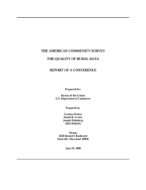The American Community Survey -- The Quality of Rural Data, Report of a Conference
The American Community Survey -- The Quality of Rural Data, Report of a Conference
Executive Summary
As a result of concerns raised about the decennial census "long form,” the Census Bureau has proposed replacing it with a continuing sample survey, known as the American Community Survey (ACS). The Census long form would be discontinued with the Census of 2010. The Census Bureau believes that the ACS, to be implemented in 2003, will provide a reliable source of timely demographic, economic, social, and housing data throughout the decade for the same jurisdictions for which data have been published in recent censuses.
Not surprisingly, as with virtually all survey efforts, the relative sampling errors of data for small population groups in the ACS will be higher than for large population groups or geographic areas containing large numbers of people. Concerns also have been expressed about other possible sources of error. This has led to questions about the quality of ACS data for small population areas, especially so for data for rural areas.
The importance of the subject and the concern of policy makers, the Congress, and the broad spectrum of potential users of the data led the Bureau of the Census to ask Westat, a private research organization, to call together a group of experts from academia, State government, and associations, who were knowledgeable about and concerned with the uses and implications for policy of data for rural areas. The agenda included discussion of the issues, review of the proposed design of the ACS and its ability to meet the data needs for small population areas, exploration of possible options, and presentation of the experts’ views and suggestions.
Several general themes can be drawn from the extended discussions over the conference period. First, there was complete support of all participants in seeing the ACS achieve full implementation. Although some technical issues still need to be resolved, this effort is seen as providing important and useful information throughout the decade and as an acceptable alternative to the Census long form.
The second theme addresses the subject of the conference--namely, issues about the quality of rural data from the ACS. Participants devoted extensive time and energy to a review and discussion of these issues. Again, they concluded that, overall, plans for the ACS recognize the many concerns for small area data and address them as best as can be expected within the constraints faced by the ACS. Further, the entire ACS planning process has been open, extensive, and responsive, with objections heard and addressed. ACS has ensured that the moving 5-year averages for data for such areas will continue to have almost the same precision as in recent decennial censuses. On the basis of the full exchange between the Bureau and the participants, they saw no evidence of an antirural bias in the design of the ACS.
Notwithstanding their overall support for ACS and its plans for rural or small area data, participants did raise questions about the planning, suggest areas that might benefit from further research or study, and note changes that might enhance the ACS, and especially data for rural areas. The third theme encompasses this activity. The suggestions with the most direct and immediate effect on ACS planning are:
- The Bureau should distribute the ACS sample through the use of a "smooth function" that samples smaller governmental units at increasingly higher rates. Doing so tends to equalize the level of precision for small governmental units of different sizes. Participants also urged the Bureau to undertake the necessary research to determine which adjustments of the sampling rates would best further smooth the disparities in the sampling errors between governmental units of different sizes.
- The Bureau has indicated its recognition of the need to ensure a "continuously updated" Master Address File (MAF). Further, it has set forth a number of approaches that will enable the ACS to overcome the rural coverage problems in the MAF. Since this is a difficult and relatively long-standing problem, the Bureau will need to undertake a large research effort and devote substantial resources if it is to meet its goals for an updated MAF.
Comments of a more general nature include:
- The Bureau needs to be highly responsive to its user community. Given its wide-ranging interests and needs, the Bureau should make every effort to provide materials explaining the survey, its objectives, its uses, and the positive aspects of averaging over time. This sensitivity also must extend to relevant and concerned public interest groups, such as local governments, appropriate governmental associations, Congressional committees, etc.
- Because ACS results will inevitably be considered for use in fund allocations, as well as in program planning, the Bureau must be sensitive to the fact that the ACS--and its data products--will be seen as "political,” and must be prepared to openly and strongly support the methodology and the quality of its products.
- The ACS, because of its size, scope, frequency, and visibility, must be sensitive to the language needs of respondents. Questionnaires should be available in a number of languages, and multilingual skills must be a resource available for telephone follow-up, as well as when and where needed for personal interview follow-up. Failure to do so will result in lower overall data quality and, more importantly, will have negative effects on political support from minority and other groups.
Others in Series
Working Paper
Working Paper
Working Paper




